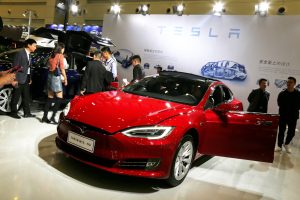As a follow-up to what he promised at the U.S.-ASEAN Special Summit earlier this year, President Joe Biden proposed the establishment of a U.S.-ASEAN Electric Vehicle Initiative at this month’s U.S.-ASEAN Summit in Cambodia.
In announcing the initiative, a flagship initiative of the U.S.-ASEAN Transportation Dialogue Partnership, Biden hopes to work with his ASEAN counterparts to create an integrated electric vehicle (EV) ecosystem in Southeast Asia. Specifically, the initiative will focus on the development of the region’s EV infrastructure, the adoption of EVs throughout the region, and the development of EV solutions and technologies for the region. In addition, the United States will also help the ASEAN to create an ASEAN roadmap for EV implementation.
First, the Initiative should be understood as an extension of the Biden administration’s domestic agenda. Biden’s passion and support for made-in-the-U.S. EVs was evident even during his presidential campaign. In addition to stating that EVs are the future of the American auto industry, he pledged to take a more active role in supporting the development of U.S. EVs. Recently, Biden even stated that EVs were an integral part of restoring American greatness.
Since taking office, Biden has taken concrete steps to promote the production and adoption of EVs in the United States. With the bipartisan Infrastructure Investment and Jobs Act, for instance, the Biden administration can invest $7.5 billion in EV chargers, more than $7 billion in the provision of critical minerals and other components which are necessary for EV battery production, and over $10 billion for clean transit and school buses. Although there are no articles in the recently passed Science and Chips Act that specifically address EVs, the Act will also stimulate their development, as sufficient and advanced chips are critical for the future of EVs. In doing so, the Biden administration is attempting to create the basis for an EV manufacturing boom and EV supply chain in the United States.
Given the huge market potential of Southeast Asia, the U.S.-ASEAN Electric Vehicle Initiative may facilitate EV trade between the U.S. and the region and create more export opportunities for EV manufacturers who have factories in the United States. Working with ASEAN is also essential for the U.S. in the sense that the region’s lower labor costs and abundance of minerals which are critical for EV production will assist the U.S. in establishing a more secure supply chain.
Second, the Initiative may also serve as part of the United States’ strategy to compete with China for global EV leadership. The Biden administration has long been dissatisfied with the U.S. market share of EVs, particularly in comparison to China. It has since vowed to “outcompete China” in the EV industry. In recent years, a growing number of Chinese EV makers have entered Southeast Asia and are eyeing business expansion in the region. For instance, BYD, Great Wall Motor (GMW), Hozon, and Aiways have all delivered their EVs in Southeast Asian countries. SAIC-GM-Wuling (SGMW) and BYD have respectively localized their own EV productions in Indonesia and Thailand. In addition, BYD has partnered with Singapore’s Agency for Science, Technology and Research on the research and development of an EV system for public transport.
It appears that China’s efforts have already yielded some positive outcomes. Data shows that the market share of Chinese EV makers in Thailand is expected to rise from 58 percent in 2021 to around 80 percent this year. With the new initiative, it seems that the Biden administration is looking beyond the cars per se when competing with China in Southeast Asia; it is aiming at shaping the region’s EV ecosystem with U.S. solutions and technologies, from EV production to the creation of EV infrastructure, such as charging stations.
Shortly after the Biden administration decided to launch the U.S.-ASEAN Electric Vehicle Initiative in Cambodia, China’s state media outlet Global Times commented that it was merely a “symbolic gesture” that the U.S. was using to woo ASEAN rather than cooperating to “achieve a truly prosperous and peaceful ASEAN,” as it claimed was China’s aim.
But it is likely that the American promises to Southeast Asia will not be matched by the commitment of resources. Addressing the U.S.-ASEAN Summit in Phnom Penh this month, Biden announced that he had requested $825 million for all types of assistance to Southeast Asia in 2023, which is a mere drop in the bucket in terms of the region’s needs. Even though Biden may pay for more EV projects in Southeast Asia, it remains unclear how much follow-up there will be.
Regardless of the outcome, the announcement of the initiative will undoubtedly intensify the already intensive EV competition in Southeast Asia. While the Biden administration is taking a more protective and inward-looking attitude towards its allies with regard to EVs, the initiative is one of the very first attempts by the U.S. to cooperate internationally on EVs, along with another recent agreement with Mexico. Given that the U.S. will “compete vigorously” with China, it is likely that the EV industry, especially the one in Southeast Asia, will soon become another hotspot of Sino-American competition.

































